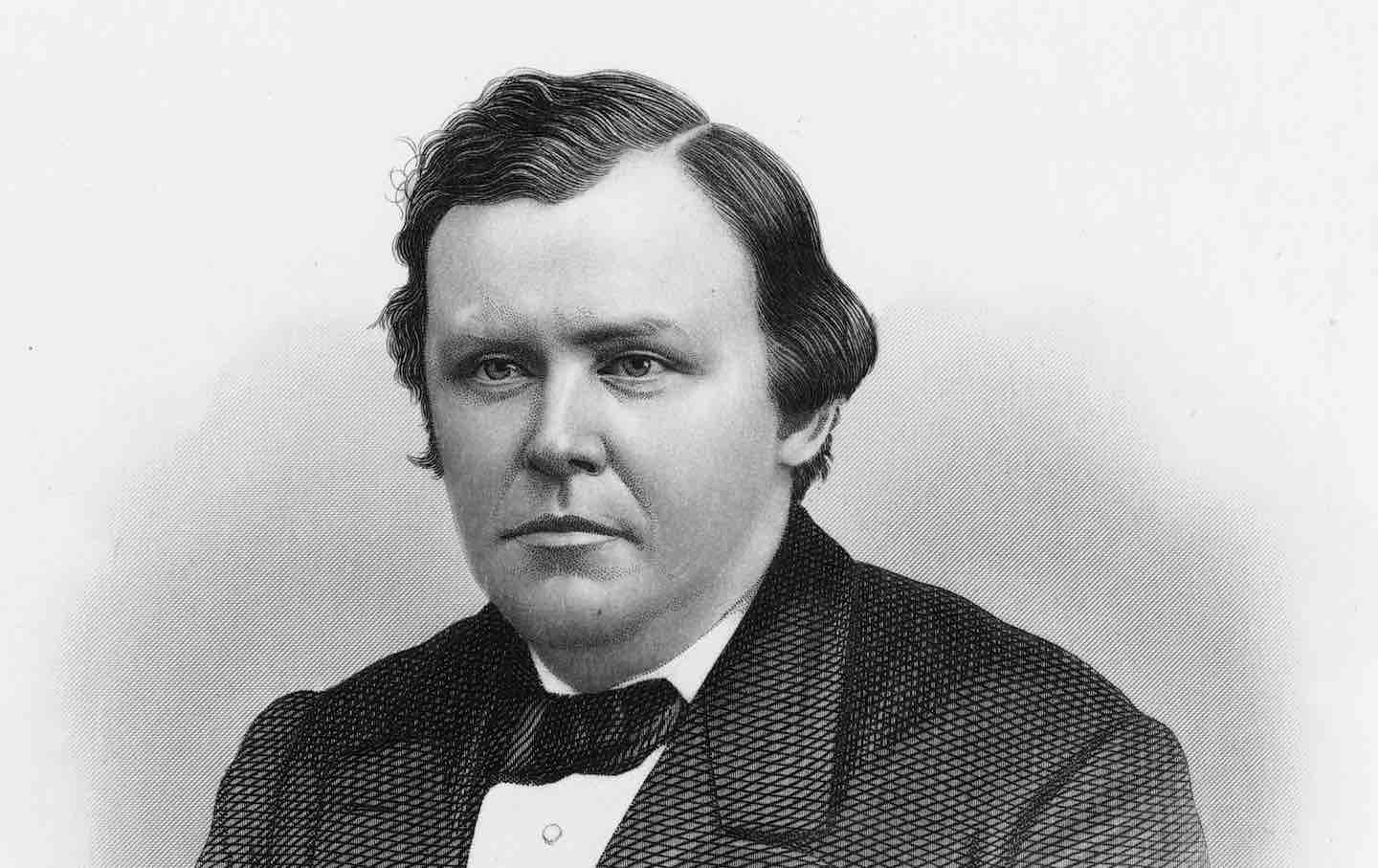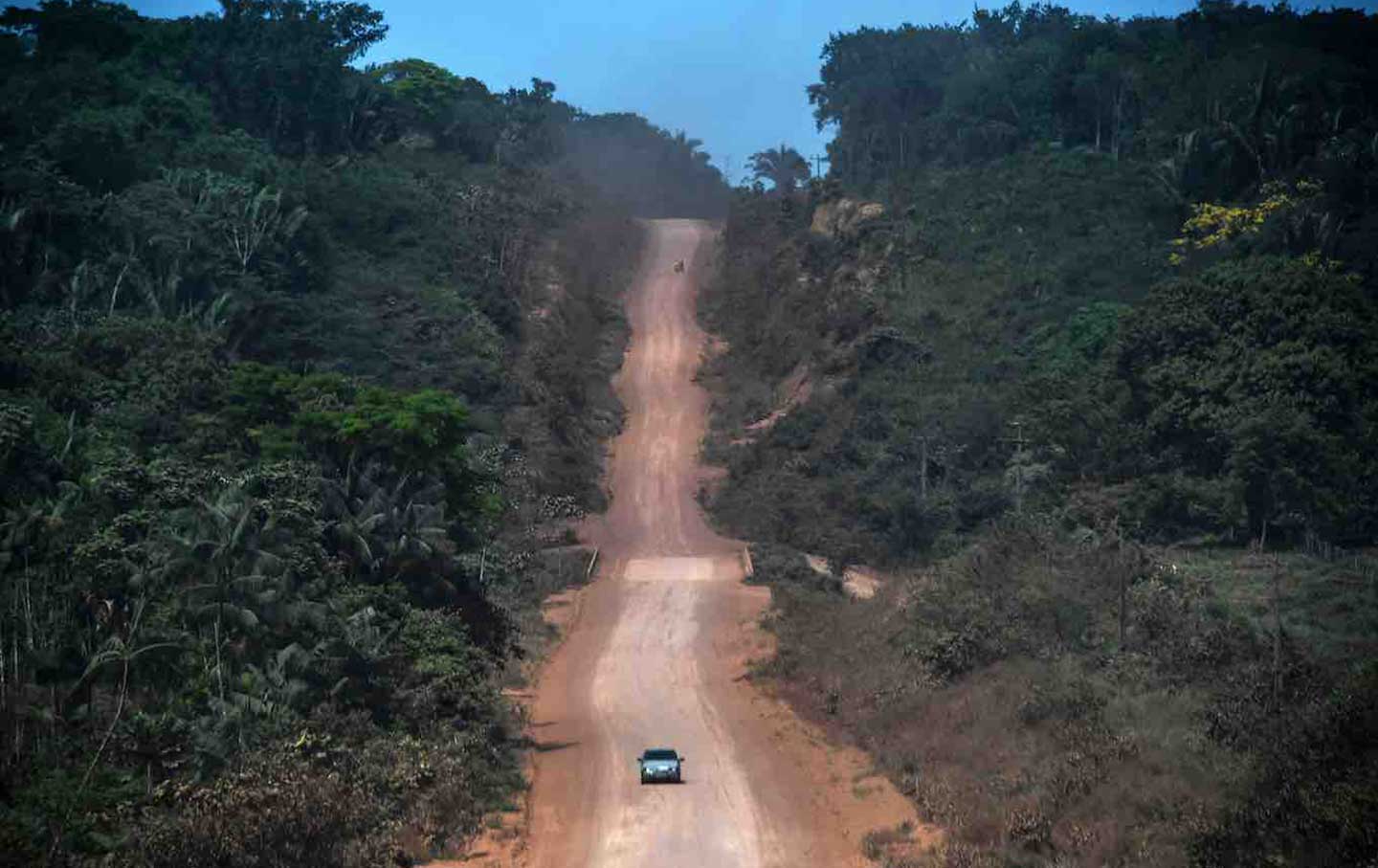Desert Planets
A desert landscape, magical spices, an occupying force, a native warrior community, and a handsome young hero, bred to liberate them—Dune: Part Two seems to have it all. But does it?
What’s Missing From “Dune: Part Two”
While Frank Herbert’s original series was about the dangers of messianism, Denis Villeneuve’s rendition wields ambivalence like a secret weapon in its effort to avoid the tough questions.

Dune: Part Two
(Courtesy of Warner Brothers)Dune: Part Two, the latest installment of Denis Villaneuve’s adaptation of Frank Herbert’s enduring (and supposedly unadaptable) science fiction series, carries a great weight on its shoulders. It must succeed as a continuation of the first movie without losing new viewers and while bearing the box office’s dreams for an industry that has flagged in comparison to last year. It must give the thrill of a big science fiction blockbuster, while seeming to undermine the transparent teenage fantasies that flourish throughout those stories.
A desert landscape, spices with magical properties, an occupying force, a community of native warriors, and a handsome young hero, bred and trained to liberate them all—Dune: Part Two has all the right elements of success, including a star-studded cast. Timothée Chalamet transforms from waif to despot; Zendaya guides the audience’s perspective with her pensive eyes; Rebecca Ferguson giving us “Reverend Mother”; Javier Bardem is both affable mentor and zealot; and Austin Butler sheds the Elvis accent and all of his hair.
Villeneuve streamlines the vast scope of Herbert’s story into a series of sweeping set pieces, more plentiful in this installment and meticulously executed. The film charts Paul Atreides’s swift rise while characterizing that rise as a cautionary tale too. For just as Paul needs to save his family and his adopted planet, Arrakis, from the occupying Harkonnens, Villeneuve must salvage knowing self-critique from the jaws of teenage fantasy clichés.
When we first meet Paul and his family in Dune: Part One, the Atreides are part of the intergalactic aristocracy and are bequeathed Arrakis by imperial decree. Arrakis is a stark, unforgiving planet. But its deserts and deadly worms also produce “spice,” the most valuable substance in the galaxy. The Atreides hope to turn around the family’s fortunes with the power of the spice production in Arrakis. They exchange the comforts and oceans of their home world for it. Yet, little do they know they have walked into a trap set by a rival family with whom they have been feuding for centuries.
In Dune: Part One, we follow Paul and the Atreides as they are stripped of all their advantages. Paul and his mother, Jessica, are left in the vast desert of Arrakis seeking safe haven with a group of Fremen, the people indigenous to the planet. Now, in Dune: Part Two, we return to Paul, who hopes to gather his strength against House Harkonnen—the villainous family that secured a planetary takeover with the emperor’s clandestine support.
Paul’s prospects are as limited as the water supply in Arrakis, and his only potential allies are the Fremen, who are understandably suspicious of outsiders. But Paul proves his worth as a warrior and earns their hospitality. Meanwhile, Stilgar, a Fremen leader, takes Paul and his mother into the Fremen’s Sietch, the cave warren where they live out of view of Harkonnen eyes. There, Paul is greeted by rumblings among some Fremen that he might be their messiah. Paul says he doesn’t want to lead; he just wants to fight alongside them.
The Harkonnens have the guns and technology, but at nearly every turn they are outmaneuvered by Paul and the Fremen. The Fremen are fierce fighters who have been hardened by desert life, and they know how to resist the Harkonnen occupation by interrupting spice extraction in every way possible.
Led by the Baron (played by a grotesque Stellan Skarsgård), the Harkonnens are cartoonish villains, and, barring Skarsgård’s game performance, their depiction feels like a shortcut in Villaneuve’s imagination. The Harkonnens are bad guys who dress in black, kill their underlings on a whim, and assemble their armies in rigid formations reminiscent of Leni Riefenstahl’s Nazi propaganda films. It’s not just that they are a cliché; it’s that caricatures are not that menacing.
The real threat to the galaxy, then, is not in a war between good guys and bad guys but in how belief can turn into violence, and self-defense into a despotic bid for power. The Fremen’s religion preaches the hope of a savior, the “Lisan al Gaib,” and as the film goes on Paul seems to perfectly fit their prophecy. Paul knows too much to be fully taken in by the religious fervor, but even his mother has a messianic prophecy that she works to bring about: She is a sister of the Bene Gesserit, a mystic cabal of political operators who advise those in power but who are also engineering the rise of their own messiah, the Kwisatz Haderach. For most of the film, Paul resists these projected messianic narratives—until he succumbs to the temptation to wield the faith of thousands as his last resort.
One of the reasons the Dune novels have been difficult to adapt is that Paul’s story is at the center of a vast scale of conspiracies and machinations. There are the Imperial House Corrino’s ambitions and their manipulation of the Atreides and Harkonnen for their own gains, and there is the Spacing Guild (left out of Villaneuve’s version altogether) that controls all interplanetary travel and depends entirely on spice. Computers have been replaced by highly trained humans, called Mentats. The Bene Gesserit have their own centuries-long eugenicist project, of which Paul is one of the most recent products. And in the novel, Paul’s story unfolds over a longer period of time. He becomes immersed in the ways of the Fremen. He spends years waging guerilla campaigns against the Harkonnen. He has a son with Chani.
Villaneuve compacts the storyline for clarity, keeping the most essential portions, if losing some of its intricacies. Yet some important elements get lost in the cuts. The awe we might feel of a man both empowered and reduced in the face of galaxy-sized projects is replaced by the awe of vast landscapes. For a film invested in grand spectacle, the desert embodies the ambivalence of a world where nothing is ever just one thing: It is a source of wealth, but also a place of death, a hostile home, a visual splendor, and an impassive vastness.
Villaneuve and cinematographer Greg Frasier capture the desert in its varieties, but their palette also limits the world to shades of bleakness. It can be striking to see a figure framed as an iconographic silhouette against a near-monochromatic backdrop, but too much of the same image weaken its profundity. There are only so many ways to look at the undulating waves of the sand against a broad beige sky, especially when the Fremen sartorial style is just as beige. Camouflage makes sense, of course, but even when we see inside the Fremen living quarters, the only pops of color are their watchful blue eyes.
Popular
“swipe left below to view more authors”Swipe →Blue eyes are a symptom of spice intake. For the Fremen, the spice is a part of life. It’s in the food they eat and the air they breathe. But for Paul there are some serious side effects, including prophetic visions out of his control. In Herbert’s novel, the effects of these visions are a more central and dramatic concern. They are fragmented and unclear, but they show Paul a religious war with an unfathomable cost and blood on his hands. Paul tries to find a way to avoid that future. But the prophecies don’t just elude his control; they fracture his sense of self. He struggles to keep his grasp on a reality that passes through his hands like a fistful of sand.
In Villaneuve’s rendition, these visions are more discrete and less fragmentary. Rather than disorient viewers, the visions hardly compete with the excitement and set pieces that surround them. We lose the sense of the mystical that percolates throughout Herbert’s novels and the ability to see possible futures other than the one Paul sees. For the most part, we are stuck within Paul’s perspective, learning the world of Dune as he does. We like Paul. His heart is in a good place, and we want to see him win. We also know how this kind of story works. Our hero starts with nothing; he resists his calling, before inevitably gaining the power he deserves. The film’s very form is structured around Paul’s ascendance, and his harrowing visions are mere speed bumps on his path to victory.
As Part Two unfolds, the film tries to distance us from our hero’s choices by foregrounding Chani’s point of view. Through Chani’s eyes, we see the costs of Paul’s rise and how Paul walks right into the choices in his visions. It is Chani’s face, her reactions, her pleading that offer a moral conscience to a world that, like its landscapes, gets bleaker and bleaker. She counsels him against the actions that lead to the end of the movie and make Paul’s nightmares a reality for everyone else.
While the original series was all about the corrosive power of adulation and the wayward paths on which messianism can lead us, Villeneuve’s Dune: Part Two is like so much film and television today: It wields its ambivalence like a secret weapon. It offers up set pieces and violent victories for viewers to revel in and draws Paul toward an apocalyptic end that becomes increasingly unavoidable. But the film doesn’t complicate our feelings as much as it performs ambivalence for us. The film warns us against the very thing it gives us. We watch from reclining chairs as Paul starts a holy war—our hands are clean. We get the heroic battles and the guilt on the side. Our hero is tortured so we don’t have to be. All we need to do is just sit back and put up our feet.
More from The Nation

The Peculiar Case of Ignatius Donnelly The Peculiar Case of Ignatius Donnelly
The Minnesota politician presents a riddle for historians. He was a beloved populist but also a crackpot conspiracist. Were his politics tainted by his strange beliefs?

The Agony of Aaron Rodgers The Agony of Aaron Rodgers
Is he the world’s most interesting athlete or is he just a washed-up crackpot?

Can You Understand Ireland Through One Family’s Terrible Secret? Can You Understand Ireland Through One Family’s Terrible Secret?
In Missing Persons, Clair Wills's intimate story of institutionalized Irish women and children, shows how a family's history and a nation’s history run in parallel.

Peter Schjeldahl’s Pleasure Principle Peter Schjeldahl’s Pleasure Principle
His art criticism fixated on the narcissism of the entire enterprise. But over six decades, his work proved that a critic could be an artist too.

How the Western Literary Canon Made the World Worse How the Western Literary Canon Made the World Worse
A talk with Dionne Brand about her recent book, Salvage, which looks at how the classic texts of Anglo-American fiction helped abet the crimes of capitalism, colonialism, and more...

Along the Roads That Built Modern Brazil Along the Roads That Built Modern Brazil
José Henrique Bortoluci's What Is Mine tells the story of his country’s laborers, like his father, who built its infrastructure, and in turn its fractious politics.


